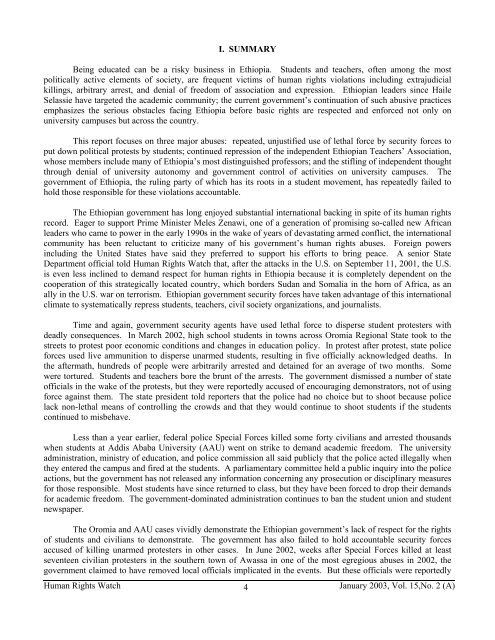Ethiopia lessons in repression: violations of academic problems, HRW
Ethiopia lessons in repression: violations of academic problems, HRW
Ethiopia lessons in repression: violations of academic problems, HRW
Create successful ePaper yourself
Turn your PDF publications into a flip-book with our unique Google optimized e-Paper software.
Human Rights Watch<br />
I. SUMMARY<br />
Be<strong>in</strong>g educated can be a risky bus<strong>in</strong>ess <strong>in</strong> <strong>Ethiopia</strong>. Students and teachers, <strong>of</strong>ten among the most<br />
politically active elements <strong>of</strong> society, are frequent victims <strong>of</strong> human rights <strong>violations</strong> <strong>in</strong>clud<strong>in</strong>g extrajudicial<br />
kill<strong>in</strong>gs, arbitrary arrest, and denial <strong>of</strong> freedom <strong>of</strong> association and expression. <strong>Ethiopia</strong>n leaders s<strong>in</strong>ce Haile<br />
Selassie have targeted the <strong>academic</strong> community; the current government’s cont<strong>in</strong>uation <strong>of</strong> such abusive practices<br />
emphasizes the serious obstacles fac<strong>in</strong>g <strong>Ethiopia</strong> before basic rights are respected and enforced not only on<br />
university campuses but across the country.<br />
This report focuses on three major abuses: repeated, unjustified use <strong>of</strong> lethal force by security forces to<br />
put down political protests by students; cont<strong>in</strong>ued <strong>repression</strong> <strong>of</strong> the <strong>in</strong>dependent <strong>Ethiopia</strong>n Teachers’ Association,<br />
whose members <strong>in</strong>clude many <strong>of</strong> <strong>Ethiopia</strong>’s most dist<strong>in</strong>guished pr<strong>of</strong>essors; and the stifl<strong>in</strong>g <strong>of</strong> <strong>in</strong>dependent thought<br />
through denial <strong>of</strong> university autonomy and government control <strong>of</strong> activities on university campuses. The<br />
government <strong>of</strong> <strong>Ethiopia</strong>, the rul<strong>in</strong>g party <strong>of</strong> which has its roots <strong>in</strong> a student movement, has repeatedly failed to<br />
hold those responsible for these <strong>violations</strong> accountable.<br />
The <strong>Ethiopia</strong>n government has long enjoyed substantial <strong>in</strong>ternational back<strong>in</strong>g <strong>in</strong> spite <strong>of</strong> its human rights<br />
record. Eager to support Prime M<strong>in</strong>ister Meles Zenawi, one <strong>of</strong> a generation <strong>of</strong> promis<strong>in</strong>g so-called new African<br />
leaders who came to power <strong>in</strong> the early 1990s <strong>in</strong> the wake <strong>of</strong> years <strong>of</strong> devastat<strong>in</strong>g armed conflict, the <strong>in</strong>ternational<br />
community has been reluctant to criticize many <strong>of</strong> his government’s human rights abuses. Foreign powers<br />
<strong>in</strong>clud<strong>in</strong>g the United States have said they preferred to support his efforts to br<strong>in</strong>g peace. A senior State<br />
Department <strong>of</strong>ficial told Human Rights Watch that, after the attacks <strong>in</strong> the U.S. on September 11, 2001, the U.S.<br />
is even less <strong>in</strong>cl<strong>in</strong>ed to demand respect for human rights <strong>in</strong> <strong>Ethiopia</strong> because it is completely dependent on the<br />
cooperation <strong>of</strong> this strategically located country, which borders Sudan and Somalia <strong>in</strong> the horn <strong>of</strong> Africa, as an<br />
ally <strong>in</strong> the U.S. war on terrorism. <strong>Ethiopia</strong>n government security forces have taken advantage <strong>of</strong> this <strong>in</strong>ternational<br />
climate to systematically repress students, teachers, civil society organizations, and journalists.<br />
Time and aga<strong>in</strong>, government security agents have used lethal force to disperse student protesters with<br />
deadly consequences. In March 2002, high school students <strong>in</strong> towns across Oromia Regional State took to the<br />
streets to protest poor economic conditions and changes <strong>in</strong> education policy. In protest after protest, state police<br />
forces used live ammunition to disperse unarmed students, result<strong>in</strong>g <strong>in</strong> five <strong>of</strong>ficially acknowledged deaths. In<br />
the aftermath, hundreds <strong>of</strong> people were arbitrarily arrested and deta<strong>in</strong>ed for an average <strong>of</strong> two months. Some<br />
were tortured. Students and teachers bore the brunt <strong>of</strong> the arrests. The government dismissed a number <strong>of</strong> state<br />
<strong>of</strong>ficials <strong>in</strong> the wake <strong>of</strong> the protests, but they were reportedly accused <strong>of</strong> encourag<strong>in</strong>g demonstrators, not <strong>of</strong> us<strong>in</strong>g<br />
force aga<strong>in</strong>st them. The state president told reporters that the police had no choice but to shoot because police<br />
lack non-lethal means <strong>of</strong> controll<strong>in</strong>g the crowds and that they would cont<strong>in</strong>ue to shoot students if the students<br />
cont<strong>in</strong>ued to misbehave.<br />
Less than a year earlier, federal police Special Forces killed some forty civilians and arrested thousands<br />
when students at Addis Ababa University (AAU) went on strike to demand <strong>academic</strong> freedom. The university<br />
adm<strong>in</strong>istration, m<strong>in</strong>istry <strong>of</strong> education, and police commission all said publicly that the police acted illegally when<br />
they entered the campus and fired at the students. A parliamentary committee held a public <strong>in</strong>quiry <strong>in</strong>to the police<br />
actions, but the government has not released any <strong>in</strong>formation concern<strong>in</strong>g any prosecution or discipl<strong>in</strong>ary measures<br />
for those responsible. Most students have s<strong>in</strong>ce returned to class, but they have been forced to drop their demands<br />
for <strong>academic</strong> freedom. The government-dom<strong>in</strong>ated adm<strong>in</strong>istration cont<strong>in</strong>ues to ban the student union and student<br />
newspaper.<br />
The Oromia and AAU cases vividly demonstrate the <strong>Ethiopia</strong>n government’s lack <strong>of</strong> respect for the rights<br />
<strong>of</strong> students and civilians to demonstrate. The government has also failed to hold accountable security forces<br />
accused <strong>of</strong> kill<strong>in</strong>g unarmed protesters <strong>in</strong> other cases. In June 2002, weeks after Special Forces killed at least<br />
seventeen civilian protesters <strong>in</strong> the southern town <strong>of</strong> Awassa <strong>in</strong> one <strong>of</strong> the most egregious abuses <strong>in</strong> 2002, the<br />
government claimed to have removed local <strong>of</strong>ficials implicated <strong>in</strong> the events. But these <strong>of</strong>ficials were reportedly<br />
4<br />
January 2003, Vol. 15,No. 2 (A)
















